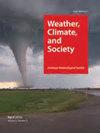Guiding Environmental Messaging by Quantifying the Effect of Extreme Weather Events on Public Discourse Surrounding Anthropogenic Climate Change
IF 1.9
4区 地球科学
Q3 ENVIRONMENTAL STUDIES
引用次数: 1
Abstract
Anthropogenic climate change promises to bring existential changes to human society in the coming years. One such example of these changes is the increasing frequency of extreme weather, capable of causing significant damage. Despite this, many Americans are acutely unaware of the relationship between climate change and extreme weather events, perhaps due to a lack of direct messaging about it. This study analyzed the effects of natural disasters on climate change discussion sentiment and volume through news media and Twitter posts. The study hypothesized that specific major natural disasters would lead to increases in the number of climate-change-related Twitter posts and news articles, as well as more positive climate sentiment, indicative of belief in the severity of global warming. Through an analysis of almost 35 million climate-change-related tweets and 300,000+ news articles, along with the collection of over 130 million natural-disaster-related tweets published in the United States between 2010 and 2020, media volume rose an average of 10% around specific extreme weather events, corroborating the first aspect of the hypothesis. The ratio of positive to negative sentiment tweets, however, decreased, suggesting the tendency of extreme weather to elicit more response from climate change deniers than supporters. Thus, increased climate change discussion around major natural disasters represents a missed opportunity for continuing to drive forward climate change messaging and awareness in the United States.通过量化极端天气事件对围绕人为气候变化的公共话语的影响来引导环境信息
未来几年,人为气候变化将给人类社会的生存带来变化。这些变化的一个例子是极端天气的频率增加,能够造成重大破坏。尽管如此,许多美国人仍然没有意识到气候变化和极端天气事件之间的关系,这可能是由于缺乏直接的信息传递。本研究分析了自然灾害对新闻媒体和Twitter帖子中气候变化讨论情绪和数量的影响。该研究假设,特定的重大自然灾害会导致与气候变化相关的Twitter帖子和新闻文章数量的增加,以及更积极的气候情绪,这表明人们相信全球变暖的严重性。通过对近3500万条与气候变化相关的推文和30多万条新闻文章的分析,以及对2010年至2020年间美国发布的1.3亿多条与自然灾害相关的推文的收集,媒体量在特定极端天气事件上平均增长了10%,证实了假设的第一个方面。然而,积极和消极情绪的推文比例有所下降,这表明极端天气倾向于引起气候变化否认者而不是支持者的更多回应。因此,围绕重大自然灾害的气候变化讨论的增加,意味着美国失去了继续推动气候变化信息和意识的机会。
本文章由计算机程序翻译,如有差异,请以英文原文为准。
求助全文
约1分钟内获得全文
求助全文
来源期刊

Weather Climate and Society
METEOROLOGY & ATMOSPHERIC SCIENCES-
CiteScore
3.40
自引率
13.60%
发文量
95
审稿时长
>12 weeks
期刊介绍:
Weather, Climate, and Society (WCAS) publishes research that encompasses economics, policy analysis, political science, history, and institutional, social, and behavioral scholarship relating to weather and climate, including climate change. Contributions must include original social science research, evidence-based analysis, and relevance to the interactions of weather and climate with society.
 求助内容:
求助内容: 应助结果提醒方式:
应助结果提醒方式:


